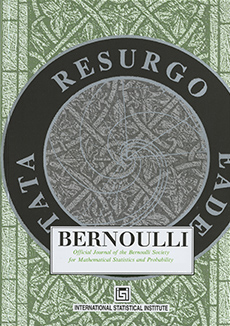Abstract
In a Bayesian framework, to make predictions on a sequence $X_{1},X_{2},\ldots $ of random observations, the inferrer needs to assign the predictive distributions $\sigma _{n}(\cdot )=P(X_{n+1}\in \cdot \mid X_{1},\ldots,X_{n})$. In this paper, we propose to assign $\sigma _{n}$ directly, without passing through the usual prior/posterior scheme. One main advantage is that no prior probability has to be assessed. The data sequence $(X_{n})$ is assumed to be conditionally identically distributed (c.i.d.) in the sense of (Ann. Probab. 32 (2004) 2029–2052). To realize this programme, a class $\Sigma $ of predictive distributions is introduced and investigated. Such a $\Sigma $ is rich enough to model various real situations and $(X_{n})$ is actually c.i.d. if $\sigma _{n}$ belongs to $\Sigma $. Furthermore, when a new observation $X_{n+1}$ becomes available, $\sigma _{n+1}$ can be obtained by a simple recursive update of $\sigma _{n}$. If $\mu $ is the a.s. weak limit of $\sigma _{n}$, conditions for $\mu $ to be a.s. discrete are provided as well.
Citation
Patrizia Berti. Emanuela Dreassi. Luca Pratelli. Pietro Rigo. "A class of models for Bayesian predictive inference." Bernoulli 27 (1) 702 - 726, February 2021. https://doi.org/10.3150/20-BEJ1255
Information





